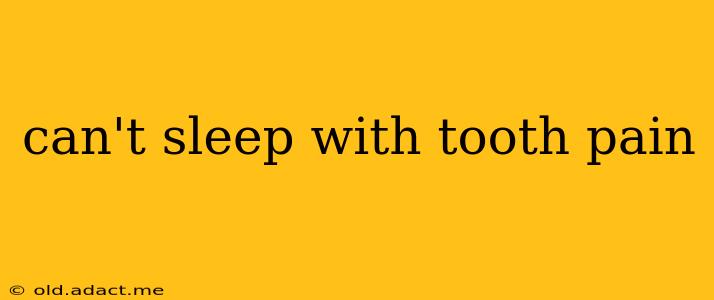Tooth pain is excruciating, and when it keeps you up at night, it feels even worse. The throbbing, sharp, or dull ache can make even the most comfortable bed feel like a torture chamber. If you're currently tossing and turning, plagued by a toothache that's stealing your sleep, know you're not alone. Millions experience this frustrating problem, and this guide is here to offer immediate relief and long-term solutions.
What Causes Tooth Pain That Keeps You Awake?
The underlying cause of your toothache will determine the best course of action. Many factors can contribute to nighttime tooth pain, including:
- Cavities: Decayed areas in your teeth can expose the sensitive nerves inside, leading to intense pain, especially when you're lying down. Gravity can cause the blood to pool around the affected tooth, exacerbating the discomfort.
- Abscessed Tooth: An infection at the root of a tooth can cause severe, pulsating pain, often accompanied by swelling and fever. This is a serious condition requiring immediate dental attention.
- Gum Disease (Gingivitis/Periodontitis): Inflamed or infected gums can press on the teeth, causing pain and discomfort.
- Bruxism (Teeth Grinding): Grinding or clenching your teeth, often unconsciously during sleep, can wear down enamel and cause significant pain.
- Cracked or Chipped Tooth: A small crack or chip might not be noticeable during the day, but it can become excruciating at night, especially if food particles get lodged in the crack.
- Sinus Infection: Sinus pain can sometimes refer to the upper teeth, causing discomfort that mimics a toothache.
- Wisdom Teeth: Impacted or partially erupted wisdom teeth are a common source of pain and inflammation.
How Can I Get Relief From Tooth Pain at Night?
While a dentist's visit is crucial for long-term solutions, several at-home remedies can provide temporary relief:
- Over-the-Counter Pain Relievers: Ibuprofen (Advil, Motrin) or acetaminophen (Tylenol) can help reduce pain and inflammation. Always follow the dosage instructions on the packaging.
- Saltwater Rinse: Dissolve a teaspoon of salt in a glass of warm water and gently rinse your mouth. This can help cleanse the area and reduce inflammation.
- Cold Compress: Applying a cold compress to your cheek near the affected tooth can help numb the area and reduce swelling.
- Dental Floss: Gently floss the affected area to remove any trapped food particles that may be irritating the tooth or gum. Avoid excessive pressure.
- Elevate Your Head: Sleeping with your head elevated on an extra pillow can help reduce blood flow to the affected area, potentially lessening the pain.
What if My Tooth Pain is Severe?
Severe tooth pain is a serious issue and should never be ignored. If your pain is intense, persistent, accompanied by swelling, fever, or difficulty opening your mouth, seek immediate dental care. Delaying treatment can lead to serious complications.
When Should I See a Dentist?
You should schedule an appointment with your dentist if you experience:
- Persistent tooth pain lasting more than a few days.
- Severe pain that interferes with eating, drinking, or sleeping.
- Swelling or redness in the gums.
- Fever or other signs of infection.
- A loose or fractured tooth.
Can Home Remedies Permanently Fix Tooth Pain?
No. Home remedies can provide temporary pain relief, but they don't address the underlying cause of the toothache. A dentist needs to diagnose and treat the problem to achieve a permanent solution. Ignoring tooth pain can lead to more significant dental issues down the line.
How Can I Prevent Tooth Pain in the Future?
Good oral hygiene is key to preventing toothaches:
- Brush twice a day with fluoride toothpaste.
- Floss daily to remove food particles and plaque.
- Visit your dentist regularly for check-ups and cleanings.
- Limit sugary and acidic foods and drinks.
- Consider a mouthguard if you grind your teeth.
This information is intended for general knowledge and informational purposes only, and does not constitute medical advice. It is essential to seek professional advice from a qualified healthcare provider for any medical concerns or before making any decisions related to your health or treatment.
